Monday, October 11
An Interview with Dov Weisglass, Sharon's Lawyer
Ari Shavit, Counterpunch, October 11, 2004
He Talks to Condi Rice Every Day
 ... We begin our conversation at a Tel Aviv cafe and then go on to his run-down office on Lilienblum Street. Dressed in gray trousers and a white shirt topped by a shiny bald pate, he looks older than his age. Quickly, though, he floods me with his historical knowledge and musical education. He is in total control, and one can accept that or not, but it can't be ignored, because it is now shaping the reality we are living.
... We begin our conversation at a Tel Aviv cafe and then go on to his run-down office on Lilienblum Street. Dressed in gray trousers and a white shirt topped by a shiny bald pate, he looks older than his age. Quickly, though, he floods me with his historical knowledge and musical education. He is in total control, and one can accept that or not, but it can't be ignored, because it is now shaping the reality we are living.
Daily call to Rice
Tell me about Condoleezza Rice. What sort of woman is she?
"She is an amazing woman. Intelligent, smart, very fair. Both educated and extraordinarily pleasant. But beneath that deep courtesy and culture, she can also be very firm. She can be decisive."
Does she ever raise her voice at you, yell at you?
"What do you mean, raise her voice? I'm older than she is, you know. The Americans don't talk like we do here."
Tell me about the dynamics of the relationship between you, and whether it's an unusual relationship.
"I am in ongoing and continuous contact with Rice. In complex times it could be every day, by phone. In less complex times it's a phone call a week. On average, I meet with her once a month. Since May 2002 I have met with her more than 20 times. And every meeting is a meeting. The shortest one was an hour and a half."
What does she call you?
"Dubi."
What do you call her?
"Condy."
And how does it work between you?
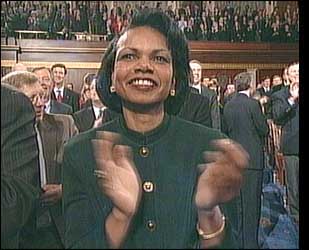
"The channel between Rice and me has two main purposes. One is to advance processes that are initiated, to examine our ideas and their ideas. The road map, for example, or the disengagement plan. But there is an equally important function, which is troubleshooting. If something happens - an unusual military operation, a hitch, a targeted assassination that succeeded or one that didn't succeed - before it becomes an imbroglio, she calls me and says, `We saw so-and-so on CNN. What's going on?' And I say, `Condy, the usual 10 minutes?'
She laughs and we hang up. Ten minutes later, after I find out what happened, I get back to her and tell her the whole truth. The whole truth. I tell her and she takes it down: this is what we intended, this is how it came out. She doesn't get worked up. She believes us. The continuation is damage control."
Rice looks like a tough cookie. Can you really talk to her freely? Can you tell her the jokes that you like to tell so much?
"We are always joking. Always. Whenever I come to Washington, I tell her stories about what's going on in Israel. I speak freely. Almost the way I'm talking to you. There is no awe, no honor. Each of us cuts into the other. I wouldn't say we are pals, but our working relationship is very friendly."
Would you say that the Weisglass-Rice channel is a strategic asset? Has it made Dov Weisglass indispensable?
"As you know, the cemeteries are full of indispensable people. I don't want to boast. But the importance of this relationship is that it enables the president to speak with the prime minister and the prime minister to speak with the president without their speaking to one another.
You have to understand that presidents and prime ministers don't prattle every day. For the president to phone the prime minister is an event. It is an act of state significance. So those conversations are very heavy. In large measure they are constrained. Whereas in this channel everything is more direct. Immediate.
"For the Americans, it's convenient. They know they have someone who is ensconced not in the jaws of the lion but in the very gullet of the lion.

It's also convenient for us. It makes it possible for us to talk to them in real time, informally.
When my conversation with Rice ends, she knows that I walk six steps to Sharon's desk and I know that she walks twelve steps to Bush's desk. That creates an intimate relationship between the two bureaus and prevents a thousand entanglements."
Have you become one of the family at the White House?
"Look, the first time you enter the White House your heart skips a beat. Anyone who tells you different is not being truthful. After all, that's where the world's chief executive sits.
But today, after 20 visits, I walk about pretty freely there. They know me well, from the Marine who stands at the entrance to the secretaries and the girls. And that makes my job at lot easier. When you are in awe, like a lawyer making his first appearance before a court, you stammer and you forget the remarks you prepared.
After a time, when you feel free and relaxed, that is a tremendous advantage. We speak totally freely. I tell her that something is right or that it's not so. Completely freely."
Have you ever had occasion to see President Bush?
"I have, but I won't talk about that. Unplanned meetings with the president are not something one talks about. For them, the concept of dropping in is the holy of holies."
What impression did you form of him?
"The president is a person of great personal charm. Focused. In control of himself. A great sense of humor. He likes jokes."
Does he like your jokes? When he sees you, does he expect a good joke?
"He has told some of my jokes to others. We heard about them afterward at second and thirdhand."
He's said to be limited.
"Why limited? Because he didn't remember the name of the president of the Czech Republic? That's very primitive criticism. President Bush is a person of character, with his own inner truth. He is sure of himself, cool, smiling. He is aware of his power. There is a lot of similarity between the way he and Arik [Sharon] manage things. They are both people with a certain inner maturity."
What about the great gap in age and experience?
"True, and I can't tell you how the president handles the question of health insurance in America. But on the issues having to do with us he has a very clear worldview. Like Arik, he has a loathing of violence; a loathing of everything having to do with terrorism and the use of force. And he has a loathing for untruthfulness and for failure to carry out commitments. He doesn't accept the Middle Eastern political style in which you come and say something and then forget what you said. From that point of view he is very American. He doesn't tolerate nonsense. He can't stand the Middle Eastern jabbering with nothing underlying it."
Are you saying that at a certain point in the past two years the Palestinians simply lost him, that they were erased from his map?
"I will not tell you anything that has not been published. But according to what has been published, two things happened. The first was the `Karine A' weapons ship.
The second was a certain piece of intelligence that I sent them that shows clearly
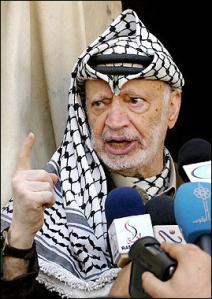
Arafat's full awareness of financial aspects of the perpetration of terrorist acts. When those things became clear about a person who swore 16,000 times to the Americans that he would make every effort to fight terrorism, he was erased. From that moment he was as good as dead."
If so, you were the one who prompted the Americans to adopt a political policy that is very close to yours: without Arafat, without terrorism, without the present Palestinian government.
[...more]
...................
WASHINGTON -- A nude painting of President George W. Bush is a little too funky for the "Funky Furniture" exhibit.
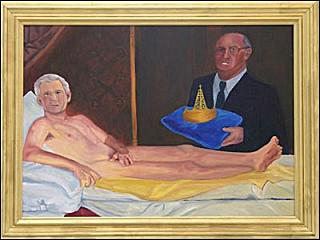
Washington artist Kayti Didriksen's painting "Man of Leisure, King George" depicts President Bush in the well-known style of Manet's "Olympia", as he is presented with his crown by a depiction of Vice President Dick Cheney.
The City Museum of Washington had scheduled a "living room art" exhibition called "Funky Furniture." A cartoonish painting, called "Man of Leisure, King George," showed a nude President George W. Bush reclining on a couch with his head propped up by pillows. It's a take-off on Manet's Impressionist masterpiece, "Olympia."
Instead of the female servant who stands behind Olympia's couch, a man in suit and tie resembling Vice President Dick Cheney stands nearby, holding a cushion with a crown and a miniature oil rig on top of it. [...more]
............
It's about the Middle East, stupid
Peter Preston, The Guardian, October 11, 2004
They didn't mention Ken Bigley, of course. He - like his two American companions - was gone, dead, brutally murdered and therefore unavailable to participate in Mr Bush's long but resolute struggle or Mr Kerry's more hopeful tomorrow.
Nor, for that matter,

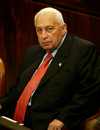

did they mention Ariel Sharon or the debris of Gaza or Saudi Arabia's fragile autocracy or Egypt's shattered tourist industry. To be honest, they didn't mention much at all.
Is that it, then? Has St Louis put a lid on foreign debate so far as this US election goes?
Is the choice for America, and therefore us, just more of the same - or "smart" plans from a supposedly smart man who seems to believe that one summit will leave the world saluting him? I'm all right, Jacques?
Once you put aside the buzz from the first joust in Florida - why did that funny little commander-in-chief keep scowling and twitching like Queeg doing his full Caine Mutiny routine? - then round two was a bit of a drag. ... ...
But it's closer by far than it was. Events, dear boy, continue to undermine White House certainties. There is too much bleating about the Bush and a clear possibility that President Kerry (like Spain's Zapatero) could actually be stuck with running a country.What then?
His fabled summit to persuade France, Germany and the rest to put in troops so America's boys can head back to Fort Bragg won't work just because Kerry isn't Bush.
The bill, the danger and the manifest unpopularity of joining a queue winding into the distance without any exit signs are constants whoever sits in the Oval Office.
Worse, to be really credible, his new, expanded coalition will need many Muslim troops on the ground. This (as the carnage in Egypt shows) is their war too. Al-Qaida is the peril within, as Saddam himself realised.
But how do you even begin to add that dimension to your alliance when, time and again, Israel kicks away its foundations?
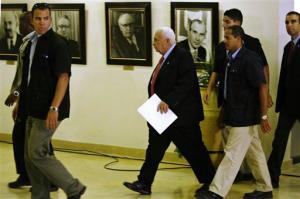
Forget the road map; forget any hope of a Palestinian state. Obfuscation is the name of Sharon's game, according to his gabbiest senior adviser, and Washington is trailing compliantly along behind. I won't deal with Arafat, Bush says proudly; but he won't deal with anybody else either.
Republican policy is an empty vessel drifting off Tel Aviv, and the Democratic alternative has just as little stored in its hold. (Indeed, on any historical test, the Democrats are less rather than more likely to stand up to an Israel going its own sweet way.)
Yet Kerry must know that the Arab world (and much of Europe) won't respond to his Iraq distress calls unless there's a decisive return to road-map action. He must know that even Blair and Bush are at loggerheads over Israel. He must realise that a fresh start here is the key to a fresh start in Baghdad.
But he didn't mention it.
[...more]

When Bush promises to keep America safe, Kerry pledges to make it even safer. When Bush promises more spending on homeland security, Kerry trumps it.
When Bush rattles on about the war on terrorism and the forces of evil who mastermind it, Kerry betrays not a murmur of nuance.
Why did Saddam want nuclear weapons? Because the real threats in his area - Israel, Pakistan, India, China and Russia - have them. Because Iran, just next door, is getting them.
Why didn't Saddam tell the UN inspectors he was flat out of WMDs and open his doors wide? Because he didn't want Tehran to know.
The complications here stretch far beyond America versus Osama and friends. The challenges and the answers we will have to find are inevitably complex and thoughtful, not tough; subtle, not no-brain certain.
But did the voters of middle America get a hint of that when they needed it?
Meet me in St Louis, Phooey!

